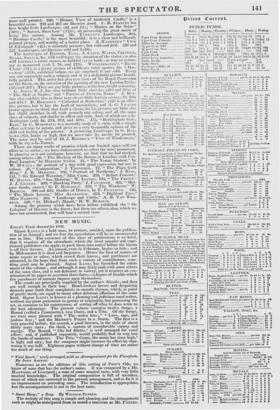NEW MUSIC.
_Lanza' s Vocal Annual for 1832.
Signor LANZA is a bold man, to venture, unaided, upon the publica- tion of an Annual ; and we fear the speculation will be an unsuccessful one to him. The existence of this class of publications is so brief, that it requires all the stimulants which the most popular and expe- rienced publishers can apply, to push them into notice before the bloom is off their flowers. An annual, even in February, begins to fade ; and by Midsummer it is dead and forgotten. Hence the host of names, of some repute or other, which crowd their leaves ; and purchasers are attracted, in the hope that from such a variety of contributors, some- thing good may be gleaned. Signor LANZA has furnished the entire music of this volume ; and although it may fairly rank with some others of the same class, and is not deficient in variety, yet it requires an exa- mination of its pages to ascertain these facts,—a degree of trouble which few purchasers of annuals impose upon themselves. The words are principally supplied by the author's friends ; and they are well enough in their way.. Heart-broken lovers and despairing damsels pour forth their complaints in smooth rhymes, which, in point of poetic merit, are equal to many other dolorous effusions of the same kind. Signor LANZA is known as a pleasing and judicious vocal writer, without any great pretension to genius or originality, but possessing the art, so common to his countrymen, of setting off what he does write to the best advantage. The present volume contains twelve Songs, a Round (called a Canzonetto), two Duets, and a Trio. Of the Songs, we were most pleased with " The stolen kiss ; " "Love, rage, and jealous fear;" and the Mariner's Prayer in a Storm. The first is a very graceful ballad ; the second, a good bravura, in the style of about thirty years since ; the third, a cantata of considerable variety and energy. The Round, " Che bel diletto," is well arranged for vocal effect ; and, if published separately, would probably find its way into the hands of amateurs. The Trio, "Come, the moon has risen high," is light and airy; but the composer might increase its effect by shor- tening it one half. Eighteen pages without change of time are rather too much of one thing.


























 Previous page
Previous page